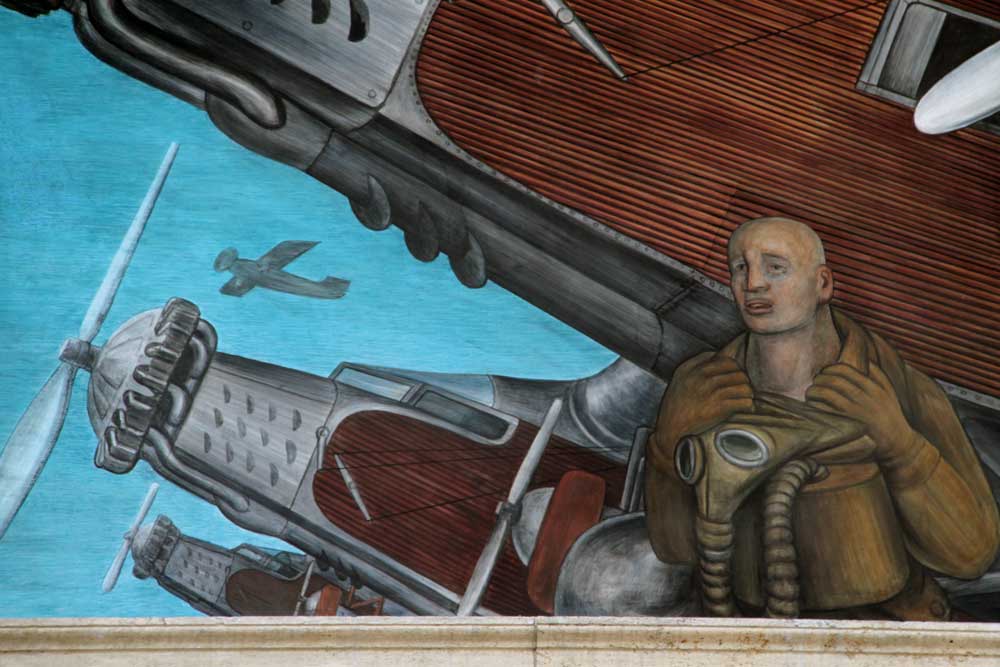a literary journal published by the Black Earth Institute dedicated to re-forging the links between art and spirit, earth and society

REASONS I SHOULDN’T WRITE ABOUT THE RUST BELT
For me, it’s the star of 8 Mile and Groundhog Day,
a series of hipsters in Minneapolis parading on bikes
through what used to be poor neighborhoods, a landscape
composing the background of Michael Moore documentaries,
whose geography I know best from Time magazine
and captured stills of ruined places, from my friend
who’d call whenever she drove through Gary
and after she traipsed the streets of Detroit
to find the Birwood Wall.
I can’t see it as the place where
a duo makes small batches of pickles, as the spot
of renaissance through urban gardens and reclaimed
parts. I can’t testify that the River Street sourdough
in Ypsi is really world-class or that ruin porn
lies, even though I’ve seen the pictures of Michigan
Central Station juxtaposed with Slow’s Barbecue.
For me, this necklace of rust is about Steelers, steel forged
by immigrant and Appalachian hands through World War II.
Maybe it’ll help to say I grew up
in the shadow of the Appalachian mountains
half a century later, that abandoned Rust Belt
photographs remind me of empty southern textile mills,
of ghost towns in the mountains, former mining towns
gone to bankruptcy and kudzu. To make these claims
as though that gives me right to speak
about a region I’ve never seen.
To tell you, how easy it is to turn my eyes
to places now claiming Population Zero and imagine
an American future: to compare Rust Belt Cities to images to Prypiat
and Juarez and Scenic, South Dakota. To ignore urban gardens,
the return of coyote and pheasant. To project
on these places my undercurrent of fear
of my own mortality
REMEMBER, YOU WILL DIE
When you drove your bright car
in Detroit, and stopped to talk with strangers
about the history of this complicated city
you can’t quite claim, I worried because
I trained myself not to trust and you
trusted the rise of artists
and artisans among ruins, mostly interlopers
among the people who stayed
as their neighborhoods emptied, as police
stopped patrolling, as nature
took over the images we’d all seen of Henry Ford’s old office
grown mossy, of the Roosevelt Warehouse
with its single tree growing among books.
Your face pinked, eyebrows furrowed
when you talked about ruin porn—
what some called momento mori—
the exploitation, how so many
of these places that we believed equaled
Detroit and the death of the American Dream
in fact stood next to thriving businesses,
beside vacant lots turned to gardens. You trailed
into less famous buildings, with urban explorers
who took only pictures and left only footprints,
fell a little in love with one of these explorers and with this city
whose motto is: “Speramus Meliora; Resurget Cineribus,”
We hope for better things; it shall rise from the ashes.
STEAMED MILK
Lonely people go to the coffee shop on 4th street, where everyone pretends
not to notice the spaniel trotting back and forth outside,
looking for her owner in a sea of chrome tables occupied by plaid flannelled
men, by women wearing brightly colored sweaters with black leggings,
by people drinking $4 drip coffee—organic, shade-grown, fair-trade, the words
meant to convey responsible choices, $4 latte, $5 chai. Carefully ironic people,
who swear they’re not hipsters say the word like it’s four letters. It doesn’t matter
the day of the week, you’ll find the same thing except the dog changes. Sometimes
it’s a Shepherd, or the three-legged Beagle named Bradley, or a rangy
mutt with wiry hair. Everyone here sits alone, or in faux-business meetings
where long-enough eavesdropping reveals an extended conversation about
webcomics or December 21, 2012, because when we’re honest
we’re all a bit obsessed
with all the possible ends of the world. Sometimes there’s a man
sitting at a table with only a bouquet
of wildflowers. Sometimes, the red-headed barista
walks down to the co-op to buy more chai-in-a-box, and passes
the tree brimming with plush monkeys. He always reaches out
to stroke the purple one with Velcro hands
clutching a low branch and it’s possible to fall
a little in love with him for this. If you let yourself sit
at the coffee shop long enough, you can watch people
watch people, because when we’re honest
we’re all a bit obsessed
with all the possible ends.
Author Biography:
Liz N. Clift’s poems have appeared or are forthcoming in Hunger Mountain, Valparaiso Poetry Review, anderbo.com, Crab Creek Review, White Whale Review, and others. Find her online at fractalsandfrost.blogspot.com.
©2025 Black Earth Institute. All rights reserved. | ISSN# 2327-784X | Site Admin